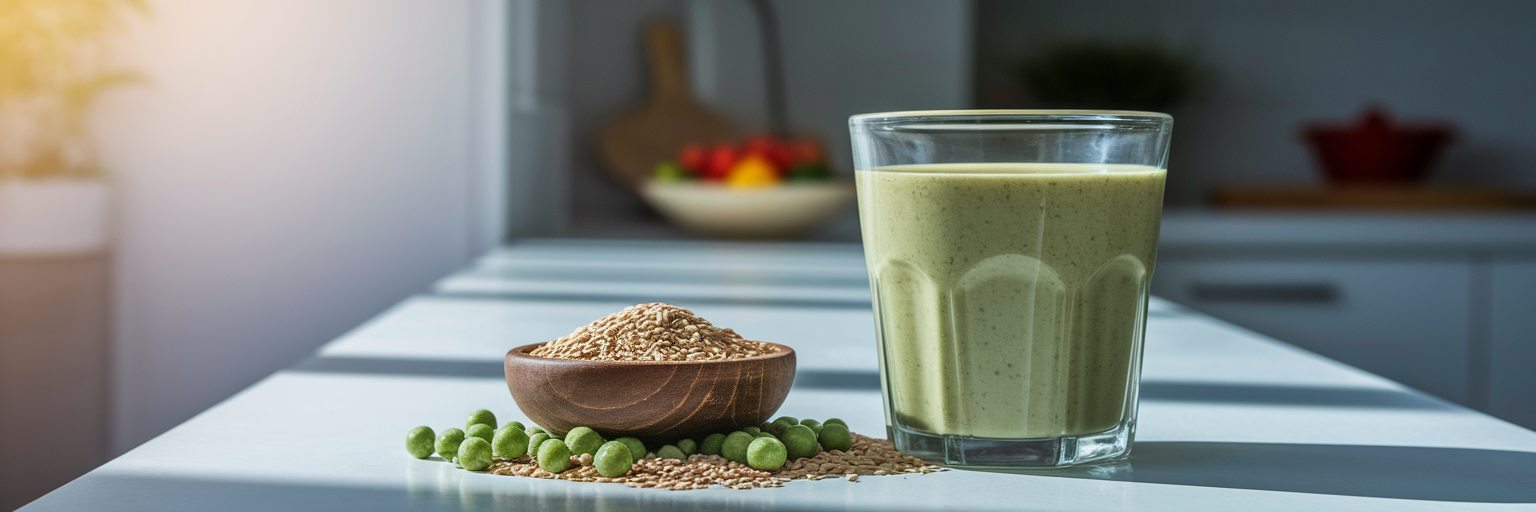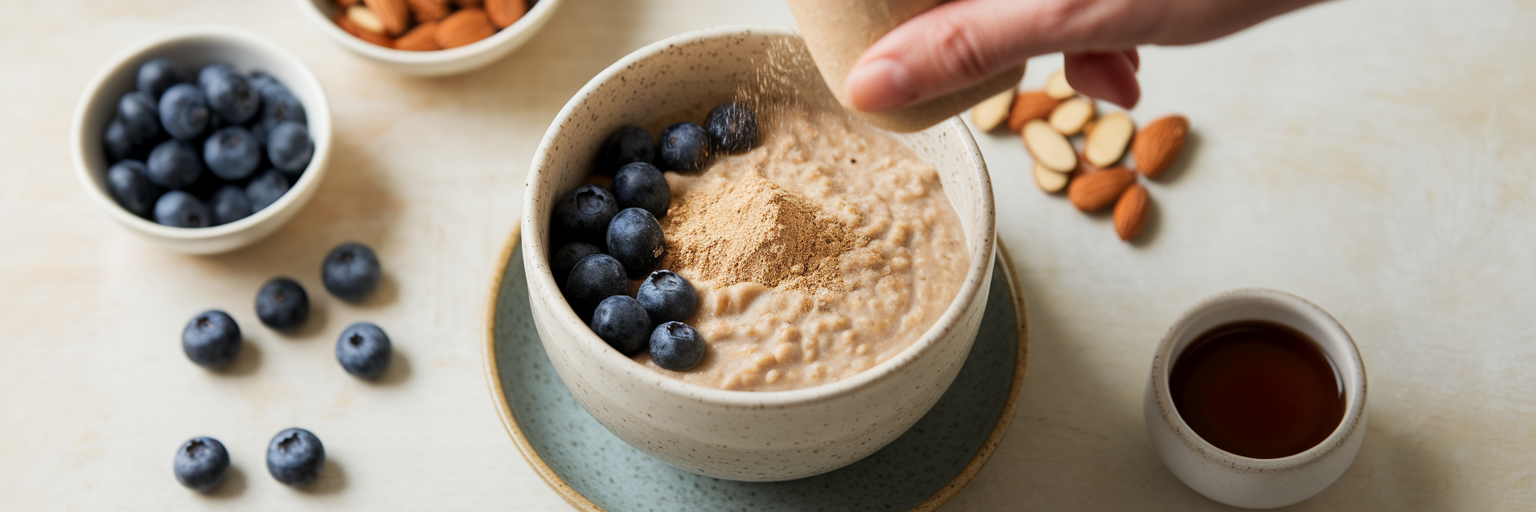The Constant Battle with Hunger and Cravings
Have you ever eaten a decent-sized lunch, only to find yourself staring into the pantry an hour later? That nagging feeling of hunger, even when you know you’ve eaten enough, is a common frustration. This is where we introduce the concept of satiety, which is simply the feeling of being full and satisfied after a meal. Achieving it isn't just about the volume of food you eat; it's about the nutritional signals that food sends to your brain.
Protein is the most powerful macronutrient for triggering these signals. It helps you feel fuller for longer, which is the secret to learning how to reduce food cravings that derail your health goals. Plant-based protein powders are an incredibly effective and convenient way to boost your protein intake, helping you finally win that daily battle with your appetite.
Understanding Protein's Role in Appetite Control

So, why does protein work so well? It’s not magic, it’s science. When you consume protein, your body responds in a few key ways. First, it influences the hormones that regulate your appetite. It helps decrease levels of ghrelin, often called the "hunger hormone," while boosting hormones that tell your brain you're full, like peptide YY. This hormonal shift sends a clear message: "We're good here, no need for more food right now."
Second, protein has a higher Thermic Effect of Food (TEF) compared to fats and carbohydrates. Think of your digestive system as a furnace. It needs fuel to break down food, and it burns more fuel to process protein. This slight metabolic boost not only helps with calorie expenditure but also contributes to that warm, satisfied feeling after a protein-rich meal. The practical result? You avoid those sharp energy dips that send you reaching for sugary snacks and maintain steady energy throughout the day.
Plant-Based vs. Animal-Based Protein for Satiety
A common question is whether plant-based proteins can keep you as full as their animal-based counterparts, like whey. The conversation around pea protein vs whey protein has evolved, and the evidence is clear: plant proteins are incredibly effective for satiety. One of the biggest advantages is fiber. Many plant protein sources, like pea and soy, contain soluble and insoluble fiber, which animal proteins lack entirely. Fiber slows down digestion and helps stabilize blood sugar, promoting a longer-lasting feeling of fullness.
This slower digestion also means a more gradual blood sugar response, helping you avoid the energy crashes that trigger cravings. Concerns about muscle growth are also becoming a thing of the past. As research from Oxford Academic confirms, plant proteins can produce similar outcomes in muscle strength and maintenance as animal-based ones. Furthermore, a study published by MDPI noted that plant-based diets are often associated with more favorable appetite patterns and a lower BMI. Exploring the different types of plant proteins can help you find the perfect fit for your goals, and you can see some of the best options we have available today.
Plant Protein vs. Animal Protein: A Satiety Showdown
| Factor | Plant-Based Protein (e.g., Pea, Soy, Rice) | Animal-Based Protein (e.g., Whey, Casein) |
|---|---|---|
| Fiber Content | Often contains soluble and insoluble fiber | Typically contains no fiber |
| Blood Sugar Impact | Generally leads to a slower, more stable glucose response | Can cause a more rapid insulin spike (especially whey) |
| Digestive Speed | Digests more slowly, promoting prolonged fullness | Whey digests very quickly; casein is slower |
| Nutrient Density | Provides phytonutrients, antioxidants, and minerals | Source of B12 and heme iron |
This table compares key attributes influencing satiety and overall metabolic health. Data points are based on general nutritional principles and findings from comparative studies on protein digestion and glycemic response.
Finding Your Ideal Vegan Protein Source

The world of vegan protein is diverse, and finding the right one for you is easier than you think. Let's break down the most popular options.
Pea Protein: The Muscle-Building Favorite
Rich in branched-chain amino acids (BCAAs), pea protein is fantastic for muscle repair and growth. It's also easily digestible and has a satisfyingly thick texture that works well in smoothies.
Soy Protein: The Complete Powerhouse
Soy is one of the few plant sources that is a "complete" protein, meaning it contains all nine essential amino acids. It has a smooth texture and a neutral flavor, making it highly versatile.
Brown Rice and Hemp Protein: The Gentle Giants
For those with sensitivities, brown rice and hemp proteins are excellent hypoallergenic choices. Hemp also offers the added benefit of healthy fats and fiber.
The Power of Blends
Often, the best vegan protein powder for women and men alike is a blend. Combining multiple sources, like pea, pumpkin seed, and sunflower seed, creates a robust and complete amino acid profile while delivering a balanced texture and flavor. If you're curious to learn more, our guide to the best protein powders can help you make an informed choice.
Creative Ways to Boost Your Protein Intake
Getting more protein doesn't have to mean drinking endless shakes. Vegan protein powder is surprisingly versatile and can be easily incorporated into meals you already love.
- Breakfast Boost: Start your day strong by mixing a scoop of protein powder into your oatmeal, pancake batter, or a yogurt bowl. This simple addition will help keep you full and focused all morning.
- Smart Snacking & Baking: Ditch the store-bought snacks. Mix protein powder into homemade energy balls, muffins, or brownies to create a satisfying treat that also fuels your body.
- Savory Solutions: This one might surprise you! Unflavored protein powder can be stirred into soups, stews, or pasta sauces to add a creamy texture and a powerful protein punch without altering the taste.
For a little inspiration, check out these 3 easy vegan protein recipes you'll actually crave to get started.
Supporting Long-Term Weight Management Goals
The immediate feeling of fullness is great, but the real benefit of using plant based protein for satiety is how it supports your long-term goals. By consistently managing your hunger, you naturally start to reduce your overall calorie intake without feeling deprived or restricted. This is the foundation of sustainable vegan protein for weight loss—it’s not a quick fix, but a strategy that works with your body.
There's a psychological win here, too. When you feel in control of your appetite, you build confidence. A healthy lifestyle starts to feel empowering rather than like a constant struggle. Incorporating a high-quality, delicious option like our chocolate vegan protein can make this healthy habit feel like a daily treat, not a chore, making it easier to stick with for good.
Making Smart Choices at the Supplement Aisle
Walking down the supplement aisle can be overwhelming. To make a confident choice, here’s a simple checklist to keep in mind:
- Read the Label: Look for a short ingredient list with minimal added sugars, artificial sweeteners, or fillers. The cleaner, the better.
- Check for a Complete Profile: Ensure the protein has a complete amino acid profile. This is often achieved with protein blends, which combine multiple plant sources.
- Look for Third-Party Certifications: Seals from organizations like NSF Certified for Sport or Informed-Sport verify that the product has been tested for purity and quality, giving you peace of mind.
Empowering yourself with knowledge is the first step. If you have more questions, our FAQ page is a great resource for answers on everything from ingredients to shipping.



